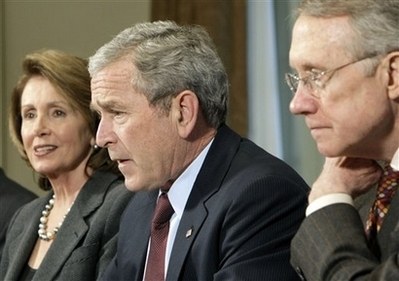Agreement closer for US economy rescue pact
Updated: 2008-01-24 08:47
WASHINGTON -- Pushing deficit concerns aside, Democratic and Republican leaders moved closer to agreement with the White House Wednesday night on emergency tax cuts and benefit increases to jolt the economy out of its slump, including opening new financing windows for some home loans.
|
|
Congressional leaders were to negotiate into the evening with Treasury Secretary Henry Paulson, underscoring the urgency of the effort.
Lawmakers learned during the day that the government's deficit already would swell to $250 billion this year because of falling corporate tax revenues -- then they signaled they were willing to balloon it higher by more than $100 billion with a stimulus package.
As they met behind closed doors, Wall Street defined volatility, dropping again for most of the day before soaring to a big gain just before closing. The Dow Jones industrials ended the day up just under 300 points.
The federal deficit, which has been dropping in recent years, could reach $379 billion for 2008 -- more than twice last year's red ink -- once the costs of the economic rescue measures are factored in, said House Budget Committee Chairman John Spratt Jr., D-S.C.
"We should act, and act now, to strengthen the economy ... mindful, however, of the long-term budget challenges, the structural deficits that we face unless we act and act seriously," Spratt said.
President Bush expressed optimism about quick action.
"I'm confident that we can get something done," Bush said in brief comments to reporters. "There's a spirit that says we need to take a fundamentally strong economy and help it."
The economic growth measure would add about $116 billion to the deficit for the budget year ending Oct. 1, according to back-of-the-envelope calculations by Spratt. All sides agree that the stimulus measures should be temporary.
"Whatever we do is going to have a 12-month shelf life," said House Majority Leader Steny Hoyer, D-Md.
Worries about the ailing economy trumped concern over the deficit as top House leaders and Paulson met three times during the day tallying up the cost of various proposals for tax rebates, business tax cuts and benefit increases, including unemployment compensation and food stamps.
House Speaker Nancy Pelosi, D-Calif., pressed to make sure tax relief would find its way into the hands of lower-income earners while Minority Leader John Boehner, R-Ohio, pushed to include upper middle-class couples with incomes of up to $130,000 or so, according to congressional aides.
"All of our discussions have been productive and have taken us in a forward direction," Pelosi said as she left an afternoon session with Paulson and Boehner.
"Until there's agreement on the entire package, we have nothing," Boehner cautioned, but he also called the discussions productive.
The rebates are the most costly portion of an emerging $145 billion economic stimulus measure. One option floated by Democrats, said Democratic congressional aides, includes rebates of at least $400 for individuals -- distributed to a wide spectrum of workers, including those in lower-income brackets -- with couples and people with children receiving more.
Bush backs larger rebates of $800-$1,600, but his plan would miss 30 million working households who earn paychecks but owe no income tax, according to calculations by the Urban Institute-Brookings Institution Tax Policy Center. An additional 19 million households would receive only partial rebates.
Paulson floated the option of making such taxpayers eligible for a refundable child tax credit of $200, said a senior House aide.
Rep. Barney Frank, D-Mass., said negotiators were near an agreement on including an overhaul of the Federal Housing Administration that would make it easier for thousands of homeowners with ballooning interest rates to refinance into federally insured loans.
Both sides also support taking temporary action to allow Fannie Mae and Freddie Mac -- government-sponsored companies that are the two biggest US financers and guarantors of home loans -- to buy loans much larger than the current $417,000 limit. He said that lending cap might reach as high as $700,000 in areas with the highest home prices.
Frank said Democrats were still pressing for expanding unemployment benefits as well as for more money for food stamps, home heating subsidies and aid to states for their Medicaid programs. But aides familiar with the talks said aid to states and for home heating subsidies were expected to be excluded.
Democrats pressed to extend unemployment benefits for people whose 26 weeks of benefits have run out; Republicans sought to limit such extensions only to states with higher-than-average unemployment rates.
Some lawmakers expressed alarm about the stimulus package more than doubling last year's deficit of $163 billion.
"I am concerned that, in our rush to help, we will talk ourselves into a quick, feel-good hit today that will leave us with a bigger budgetary hangover tomorrow," said Rep. Paul Ryan of Wisconsin, top Republican on the budget panel.
In the Senate, Democratic leader Harry Reed of Nevada and and Republican leader Mitch McConnell of Kentucky have agreed to stand back and let the House take the lead in the talks with the administration.
The aim is to have legislation ready for Bush to sign in just a few weeks, lightning speed for tax and spending measures that can take months or even years to win approval.
|
|
|
||
|
||
|
|
|
|
